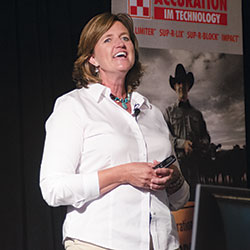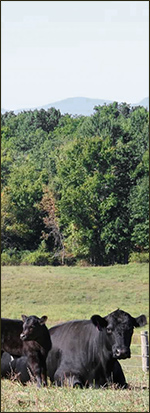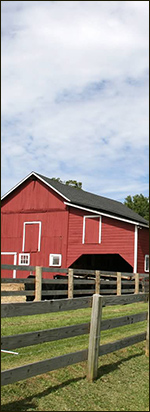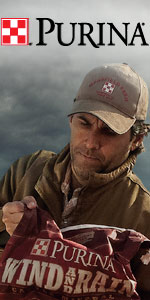Listening and Communicating
Debbie Lyons-Blythe shares how her blog helps her connect to consumers on their level.
ALBANY, N.Y. (Aug. 28, 2013) — Debbie Lyons-Blythe told attendees Aug. 28 at the 2013 National Angus Conference & Tour in Albany, N.Y., that she started blogging because of a relative just one generation removed from the farm who started asking her about antibiotics in beef and hormones in milk during a yearly visit. She said she finished her first blog post before that relative had made it home to Colorado.

Debbie Lyons-Blythe shared that 95% of consumers trust farmers and ranchers to provide safe, nutritious food. She said that doesn’t mean to her, however, that what farmers and ranchers do is more important than any other job.
Lyons-Blythe said telling her story has changed since that first post in 2009. She said there must now be a conversation; she can’t talk exclusively about agriculture or cattle because no one wants to hear about it nonstop. Lyons-Blythe said she takes the opportunity to connect with her audience (mostly moms who are not involved in agriculture), through stories about her kids or with recipes. She uses those shared interests to provide positive facts about animal agriculture.
“Listen,” Lyons-Blythe said. “Don’t just talk.”
She shared that 95% of consumers trust farmers and ranchers to provide safe, nutritious food. She said that doesn’t mean to her, however, that what farmers and ranchers do is more important than any other job. Lyons-Blythe said one way to connect with consumers is to respect what they do (teaching, working in tire factories or wastewater treatment plants, etc.), while helping them be aware of the work farmers and ranchers do and the level of care they provide for their animals.
“Most consumers are just doing the best they can,” she said. “They are just like us.”
Lyons-Blythe said she knows she can’t change an activist’s mind; she just hopes to be able to influence one mom’s thinking when confronted by the often subtle anti-meat propaganda used by the Humane Society of the United States (HSUS) and many other activist groups.
She talked about how she uses Facebook, Twitter and Pinterest to promote her weekly blog posts, and that she often tweets and posts photos using her phone while on the tractor, in the truck checking pastures or doing other chores.
She has also advocated for agriculture with farm and ranch tours, reading at schools and by handing out samples in grocery stores. Lyons-Blythe agrees with the National Cattlemen's Beef Association (NCBA) that many phrases used by farmers and ranchers are buzz words that have “factory farm” connotations. She uses the term “the beef community” instead of "beef industry" to talk about what she and her family do. She said she is careful to always say they raise "traditional" beef, not "conventional" beef, and she identifies herself as a "cattle rancher," not a "rancher".
Lyons-Blythe ended her presentation by saying that blogging isn’t for everyone, but everyone in agriculture can be involved in advocacy by looking at the other interests they have and using those as opportunities.
“How can you connect? With dads? Do you golf? Do you know people who knit? Do you have grandkids in a local school? Everybody has a way they can relate,” she said.
Editor’s Note: This article was written by staff or under contract for the Angus Journal®, formally known as Angus Productions Inc. (API). It may not be reprinted without the express permission of API. If you would like to reprint or repost this article, request permission by contacting the editor at 816-383-5200; 3201 Frederick Ave., Saint Joseph, MO 64506. API claims copyright to this website as presented. We welcome educational venues and cattlemen to link to this site as a service to their audience.




